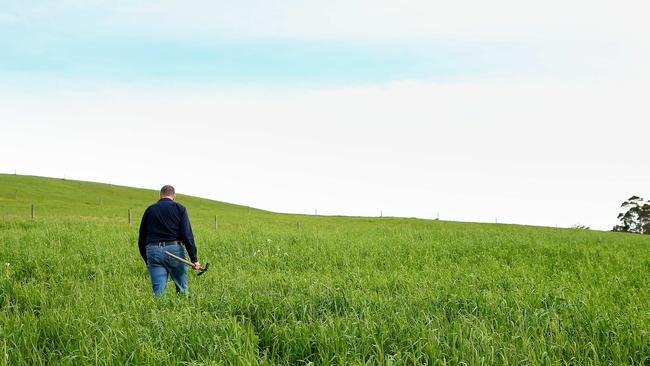Carbon credits scheme criticism ‘unfounded’: Angus Taylor
Criticisms of Australia’s carbon credits scheme are ‘completely unfounded’ and a direct attack on farmers, traditional owners and public servants, says Energy Minister Angus Taylor.

Energy Minister Angus Taylor says significant criticisms of the nation’s carbon credits scheme – a rort, according to former senior government advisory chairman Andrew Macintosh – are “completely unfounded” and a direct attack on farmers, traditional owners and public servants.
In a speech to the Carbon Market Institute on Friday, Mr Taylor will accuse the Australian Conservation Foundation of “backing away” from the claims made by Professor Macintosh.
Separately, a flagged veto on some native forest regeneration carbon projects will begin next Friday, the government will announce. Under those changes, the agriculture minister will be able to stop projects if they are deemed to have an adverse impact on agricultural production and regional communities.
These native forest regeneration projects, along with other methods, generate ACCUs after being registered with the Clean Energy Regulator.

But the ACCU scheme has come under considerable criticism including from Professor Macintosh, a law academic at the Australian National University who has chaired the government’s Emissions Reduction Assurance Committee – the body tasked with ensuring the integrity of carbon offset projects.
Professor Macintosh told the ABC’s 7.30 program last Thursday that the nation’s carbon market had “degenerated to become a rort”. “Payments are being made to people to not chop down forests that were never going to be chopped down, to grow forests that are already there, to grow forests in places that will never sustain permanent forests,” he said.
But Mr Taylor will say many of those allegations – now being investigated by the ERAC and the regulator – had already been considered and “were not supported by evidence”.
“Many of (the market’s) participants are feeling aggrieved by accusations which do not appear to be substantiated by the academic papers,” he will say.
“When industries come under political attack, they have a responsibility to stand up – not for themselves, but for the facts.
“It is telling that groups like the ACF have backed away from this latest round of attacks on the ERF and are no longer promoting the claims that have been refuted by the regulator.”
The carbon market has been in a state of flux, with the decision to intervene in the system by allowing developers contracted to the Emissions Reduction Fund to sell their abatement on the open market – causing a slump in the price of ACCUs.

After trading as high as $57 per unit – representing one tonne of carbon dioxide abatement – the spot price of ACCUs has fallen to around $30 per tonne.
Under the government’s change, the Emissions Reduction Fund’s current fixed delivery contract holders will be able to pay an exit fee – equal to the buyer’s market damages provisions in their contracts – to convert to optional delivery.
“I know that the possibility of using BMD provisions to take advantage of higher voluntary private market prices has been discussed openly in industry circles for some months prior to this change,” Mr Taylor will tell the Carbon Market Institute’s carbon farming industry forum.
“If that had occurred, the regulator would have been obliged to pursue legal remedies under the contract, including suing for debts resulting from non-delivery.
“A disorderly exit of this nature would inevitably lead to disputes over damages for each failed delivery … by contrast, the exit arrangement provides for an orderly transition away from the fixed delivery contracts.”
Mr Taylor will say that the changes will not reduce the total amount of funding available to Emissions Reduction Fund projects by “in fact, allow more projects to be supported”.
“Given the overwhelming preference for optional delivery contracts, the regulator will not be offering any new fixed delivery contracts at Auction 14, which will be held next week,” he will say. “Optional delivery contracts will enable the ERF will underwrite a greater number projects, delivering more abatement towards Australia’s 2030 Paris and 2050 net zero targets.


